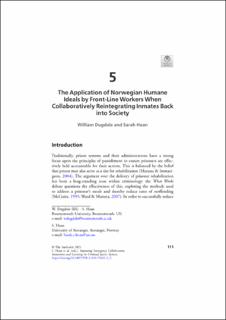| dc.contributor.author | Dugdale, William | |
| dc.contributor.author | Hean, Sarah Catherine Patricia Duff | |
| dc.date.accessioned | 2023-03-09T10:15:56Z | |
| dc.date.available | 2023-03-09T10:15:56Z | |
| dc.date.created | 2021-03-09T11:57:56Z | |
| dc.date.issued | 2021 | |
| dc.identifier.citation | Dugdale, W., & Hean, S. (2021). The application of Norwegian humane ideals by front-line workers when collaboratively reintegrating inmates back into society. Improving Interagency Collaboration, Innovation and Learning in Criminal Justice Systems, 111. | en_US |
| dc.identifier.isbn | 9783030706616 | |
| dc.identifier.uri | https://hdl.handle.net/11250/3057282 | |
| dc.description.abstract | The purpose of this chapter is to explore how the humane Norwegian policy principles and values may impact the prison-based practices and the implications of these for the collaborative work undertaken by front-line personnel. Humane traditions are considered a substantial focus of the Norwegian prison system and its policies. The approach in Norway is supported by increasing empirical evidence that shows the system to centralise the welfare of inmates. It emphasises offender rehabilitation and reintegration rather than merely punishment as a fundamental means to reduce reoffending. However, the collaborative practice that may arise as a consequence of these traditional values is underexplored. Two case studies were undertaken with front-line staff working in a Norwegian prison transitional residence (Overgangsbolig). This is the final phase of an inmate’s sentence while being reintegrated back into society. The study found that staff in their collaborative working practices adhered either to the aim of normalising the lives of their inmates after long periods of incarceration (normalisation ideals) or reparative ideals that reflected the system’s humane focus on rehabilitation and reintegration takes precedence over punishment. We conclude that irrespective of differing professional disciplines, there seems to be compatibility between the overarching principles and values of penal policy and front-line ideals to promote collaborative practices at the reintegrative phase of the Norwegian prison system. The shared application of these humane ideals promoted collaborative practice among the front-line workforce while focusing upon the provision of welfare to inmates and their impending reintegration back into society. | en_US |
| dc.language.iso | eng | en_US |
| dc.publisher | Springer | en_US |
| dc.relation.ispartof | Improving interagency collaboration innovation and learning in criminal justice systems : Supporting offender rehabilitation | |
| dc.rights | Navngivelse 4.0 Internasjonal | * |
| dc.rights.uri | http://creativecommons.org/licenses/by/4.0/deed.no | * |
| dc.title | The application of Norwegian humane ideals by front-line workers when collaboratively reintegrating inmates back into society | en_US |
| dc.type | Chapter | en_US |
| dc.description.version | publishedVersion | en_US |
| dc.rights.holder | The authors | en_US |
| dc.subject.nsi | VDP::Samfunnsvitenskap: 200::Kriminologi: 350 | en_US |
| dc.source.pagenumber | 111-138 | en_US |
| dc.identifier.doi | 10.1007/978-3-030-70661-6_5 | |
| dc.identifier.cristin | 1896613 | |
| cristin.ispublished | true | |
| cristin.fulltext | original | |
| cristin.qualitycode | 2 | |

